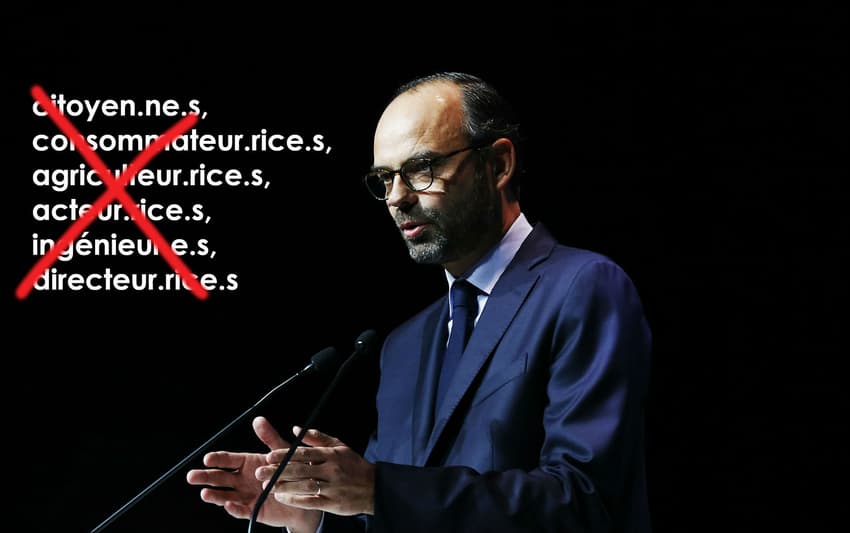French PM bans ministers from using female-friendly writing

French PM Edouard Philippe has struck a blow against moves towards making French grammar and writing less macho by banning gender equal words from official government texts.
The French government has made it clear what it thinks of so-called "inclusive writing", an attempt to make French grammar more gender equal and less macho by putting the feminine AND masculine forms of nouns in the text.
French Prime Mininister Edouard Philippe has waded into the row over inclusive writing for the first time and made it clear where the government stands by telling ministers he doesn't want to see it in official texts.
"State administrations must comply with grammatical and syntactic rules, especially for reasons of intelligibility and clarity," said Philippe to justify his decision.
His intervention echoed that of one his predecessors Jean-Marc Ayrault who famously told his ministers to stop using English.
A move towards "inclusive writing" has been dominating headlines in France recently ever since the Academie Francais - the guardians of the French - issued a "solemn warning" stating that moves to make French less sexist were an "aberration".
Supporters say its aim is to promote gender equality and reduce sexist stereotypes and to "make women more visible" in texts. They want to alter the grammar rule in French that says "masculine form must prevail over feminine form".
But the Academie said it puts the French language "in mortal danger for which our nation will be accountable to future generations."
READ ALSO:
-
OPINION: The French language isn't sexist, it's the people who speak it
-
French PM to ministers: Stop using English
 Photo: AFP
Previously texts in French have only included the masculine form of nouns for example citoyen (citizen) consommateurs (consumers) or agriculteurs (farmers) but if inclusive writing was used then the words have to be written as follows to include the feminine and plural forms: citoyen.ne.s, consommateur.rice.s, agriculteur.rice.s.
Other examples include "acteur.rice.s (actor/actress), ingénieur.e.s (engineer) and directeur.rice.s (directors).
Inclusive writing also encourages avoiding the word man, where possible, or just simply adding "and women" where appropriate.
The current controversy around inclusive writing was kicked off by the publishers Hatier who chose to rewrite a school text book using the gender equal grammatical forms.
But for the Academie Francaise it is already difficult to acquire a language without adding all the new forms on the end of words, the guardians say, adding that future generations would be put off written French if these changes become commonly used.
Philippe also instructed his ministers ministers to ensure that the traditional form be used in all public services under their authority.
The prime minister's office told AFP that the memo aimed to "end the controversy" but assured that the government was still "resolutely committed to strengthening equality between women and men."
Photo: AFP
Previously texts in French have only included the masculine form of nouns for example citoyen (citizen) consommateurs (consumers) or agriculteurs (farmers) but if inclusive writing was used then the words have to be written as follows to include the feminine and plural forms: citoyen.ne.s, consommateur.rice.s, agriculteur.rice.s.
Other examples include "acteur.rice.s (actor/actress), ingénieur.e.s (engineer) and directeur.rice.s (directors).
Inclusive writing also encourages avoiding the word man, where possible, or just simply adding "and women" where appropriate.
The current controversy around inclusive writing was kicked off by the publishers Hatier who chose to rewrite a school text book using the gender equal grammatical forms.
But for the Academie Francaise it is already difficult to acquire a language without adding all the new forms on the end of words, the guardians say, adding that future generations would be put off written French if these changes become commonly used.
Philippe also instructed his ministers ministers to ensure that the traditional form be used in all public services under their authority.
The prime minister's office told AFP that the memo aimed to "end the controversy" but assured that the government was still "resolutely committed to strengthening equality between women and men."
Comments
See Also
The French government has made it clear what it thinks of so-called "inclusive writing", an attempt to make French grammar more gender equal and less macho by putting the feminine AND masculine forms of nouns in the text.
French Prime Mininister Edouard Philippe has waded into the row over inclusive writing for the first time and made it clear where the government stands by telling ministers he doesn't want to see it in official texts.
"State administrations must comply with grammatical and syntactic rules, especially for reasons of intelligibility and clarity," said Philippe to justify his decision.
His intervention echoed that of one his predecessors Jean-Marc Ayrault who famously told his ministers to stop using English.
A move towards "inclusive writing" has been dominating headlines in France recently ever since the Academie Francais - the guardians of the French - issued a "solemn warning" stating that moves to make French less sexist were an "aberration".
- OPINION: The French language isn't sexist, it's the people who speak it
- French PM to ministers: Stop using English

Join the conversation in our comments section below. Share your own views and experience and if you have a question or suggestion for our journalists then email us at [email protected].
Please keep comments civil, constructive and on topic – and make sure to read our terms of use before getting involved.
Please log in here to leave a comment.